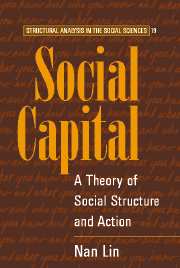Book contents
- Frontmatter
- Contents
- Preface
- Part I Theory and Research
- 1 Theories of Capital
- 2 Social Capital
- 3 Resources, Hierarchy, Networks, and Homophily
- 4 Resources, Motivations, and Interactions
- 5 The Theory and Theoretical Propositions
- 6 Social Capital and Status Attainment
- 7 Inequality in Social Capital
- Part II Conceptual Extensions
- Part III Epilogue
- References
- Index
5 - The Theory and Theoretical Propositions
Published online by Cambridge University Press: 05 June 2012
- Frontmatter
- Contents
- Preface
- Part I Theory and Research
- 1 Theories of Capital
- 2 Social Capital
- 3 Resources, Hierarchy, Networks, and Homophily
- 4 Resources, Motivations, and Interactions
- 5 The Theory and Theoretical Propositions
- 6 Social Capital and Status Attainment
- 7 Inequality in Social Capital
- Part II Conceptual Extensions
- Part III Epilogue
- References
- Index
Summary
The discussions of the structure, interaction, and action aspects of social capital described in the previous three chapters have laid the groundwork for specifying propositions to guide research. This chapter will summarize the major principles presented so far and will then present the theory's principal propositions.
The Theory of Social Capital
The theory of social capital focuses on the resources embedded in one's social network and how access to and use of such resources benefit the individual's actions. Resources are defined as valued goods in a society, however consensually determined, the possession of which maintains and promotes an individual's self-interest for survival and preservation. The values are normative judgments rendered on these goods. For most societies, they correspond to wealth, reputation, and power. The theory focuses on those actions that are taken for the purpose of either maintaining or gaining valued resources.
Resources can be either ascribed or acquired. Ascribed resources are those one is born with, such as gender and race. Other resources are prescribed by inheritance, such as caste and sometimes religion, and may include parental resources. Resources can also be acquired, such as education, or prestigious or authoritative jobs. When resources are being invested for expected returns in the marketplace, they become social capital.
- Type
- Chapter
- Information
- Social CapitalA Theory of Social Structure and Action, pp. 55 - 77Publisher: Cambridge University PressPrint publication year: 2001
- 1
- Cited by



